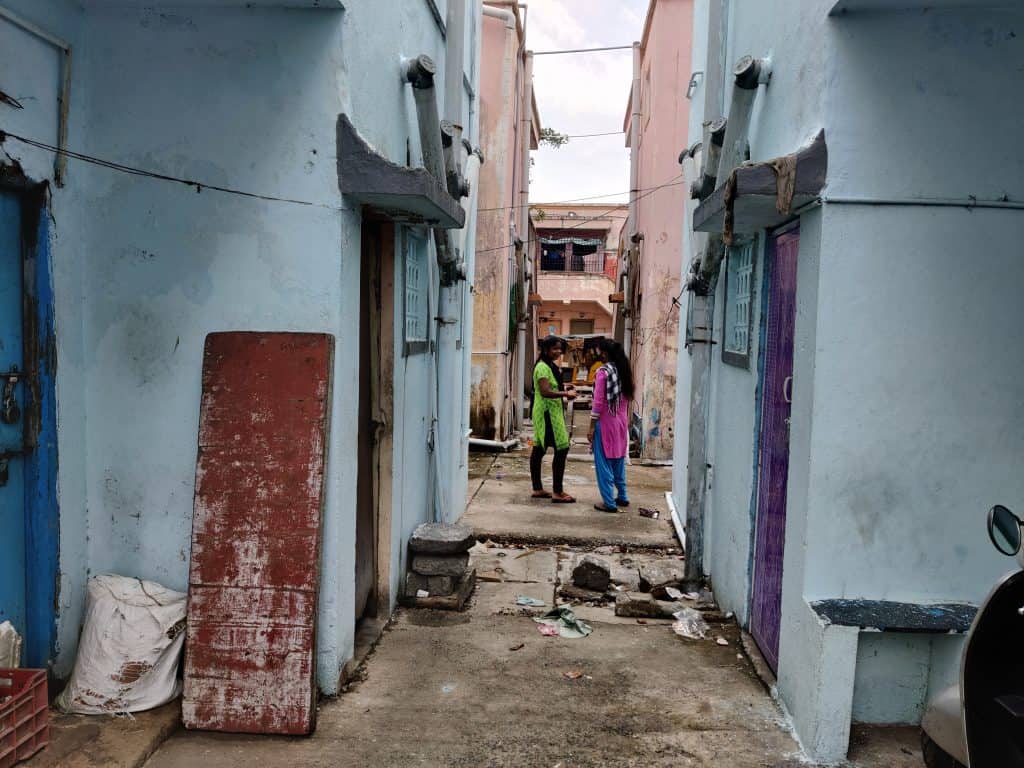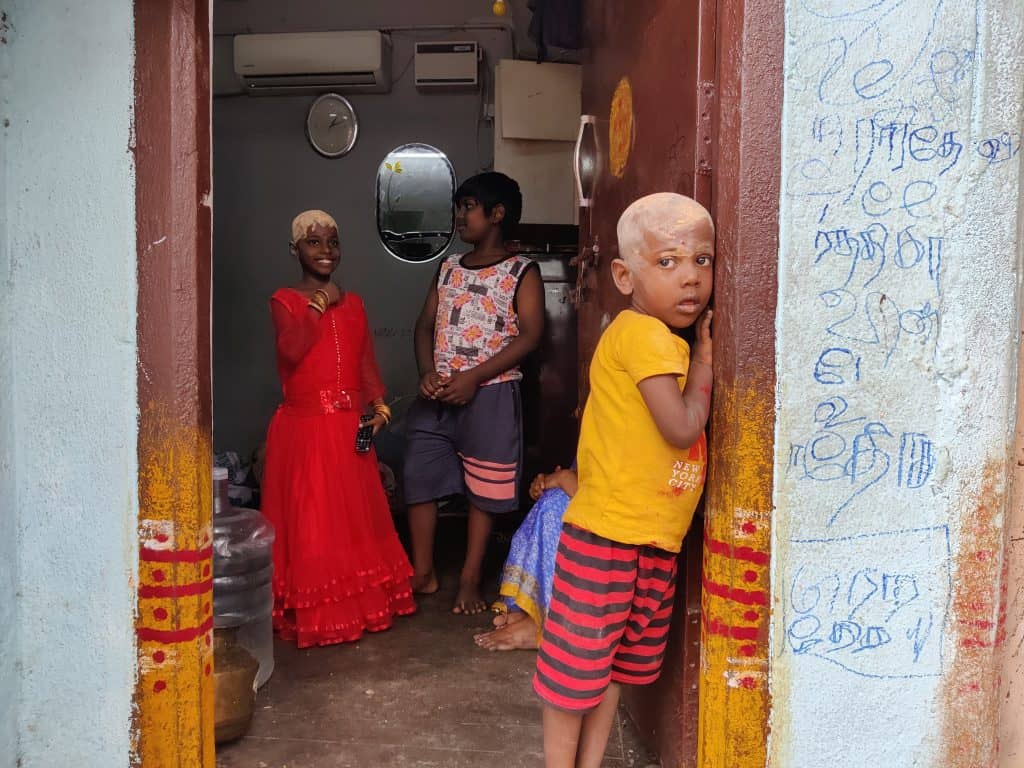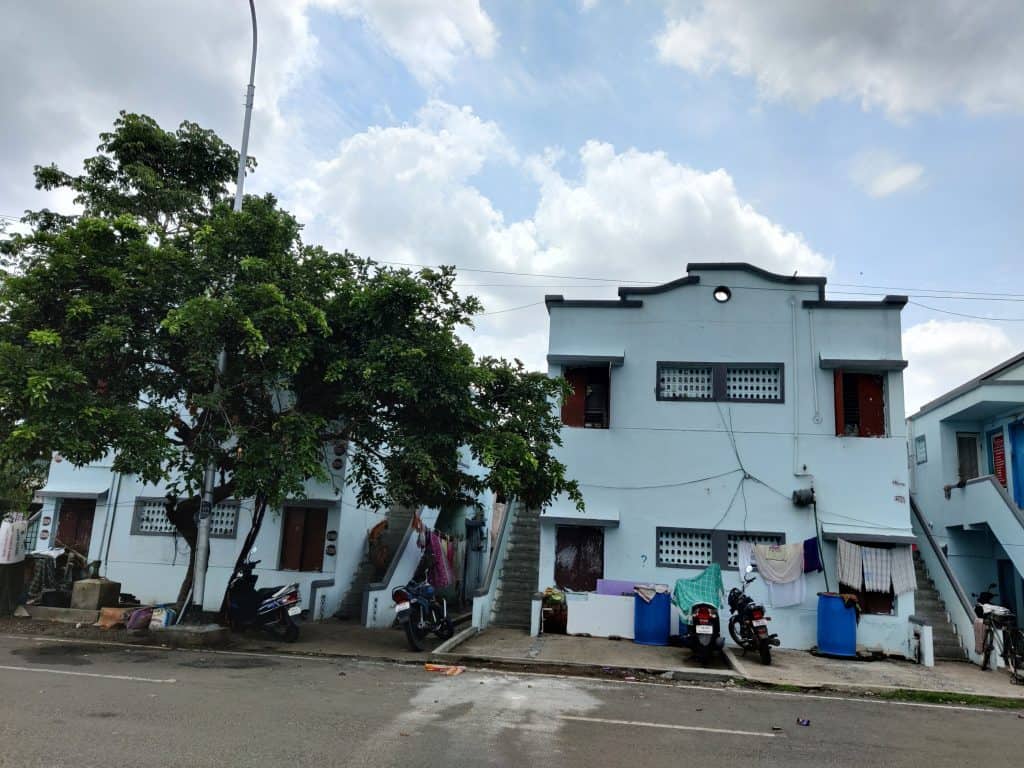In her 158 sq ft home in Semmencherry Housing Board, 12-year-old S Kumudha* chops vegetables, while her elder brother is busy writing an assignment. Kumudha will later make a quick lunch and clean the house; her brother will attend an online class. Both their parents are daily wage labourers, who are out at work from morning to dusk. Kumudha takes the load off her mother by doing the domestic chores. Her mind, once intrigued by the concepts of geometry and the Indian Constitution, is now entirely engrossed with south Indian cuisine.
It wasn’t always like this, though. Kumudha and her brother were pupils at a private school in Semmencherry. COVID-19 hit the livelihood of their parents, leaving them with no option but to pull both kids out of the private school. “The school’s management would not give the transfer certificate unless we paid the dues,” says Kumudha’s father, who works as an electrician. “We could only afford to pay the dues of one kid”. Her mother works as a domestic help.
Their son now studies in a nearby government school, while the daughter has not been enrolled anywhere yet. “Only recently did we learn that a transfer certificate is not necessary to get admission in a government school,” says Kumudha’s mother. “We are persuading Kumudha to go back to school, but she shows no interest”.
Lack of awareness about school admission has resulted in many girl children in Semmencherry dropping out of school. “According to the Right to Education Act, 2009, transfer certificates in government schools are necessary only for class 10 students,” says K. Kanchana, project coordinator, Thozhamai, an NGO that works for the rights of children, youth and women from the socially deprived communities. “Not knowing this, parents only paid the boy child’s fees to the private school to get the certificate. The girl child’s education was ignored”.
But why doesn’t Kumudha want to go back now, when she can? “I am scared of going back to school,” she finally admits. “I don’t remember much of any of the subjects”.
Schools are a safe haven for children, especially girls. Most of Semmenchery’s girl students, even if they have not dropped out, are burdened with domestic chores, sibling care and cooking. Like Rithika M, a 9-year-old resident of Semmencherry who takes care of her two younger siblings aged eight and four. She attends online classes whenever her father – the only member of the family with a mobile phone – is home.
“I like school so much because I can play with my friends,” says Rithika, who after doing the household chores and taking care of her siblings gets very little time for herself and often misses her homework.
Read more: How students with hearing impairment are coping with virtual classes
COVID-19 impact on education of girl children
Kumudha’s story mirrors the gender impact of COVID-19 among lower-income groups such as residents of the Semmencherry Housing Board. They were relocated from 23 slum pockets of Chennai in 2006. Working in the city’s unorganised sector, most of the residents commute more than 30 km one way to go to their workplace.
The loss of jobs due to COVID lockdown and other restrictions has directly impacted children in such housing boards. While the majority of Semmencherry’s children study in the three government schools in the neighbourhood, ambitious parents who enrolled their children in private schools are now pulling them out to join government schools.
In all of this, the impact on the education of girl children has been particularly catastrophic. Before COVID-19, India had 30 million out-of-school children, out of which 40% were adolescent girls. It is projected that post-COVID-19, close to 10 million secondary school girls might drop out and a large number of these are likely to be in India, says a report by the Centre for Budget and Government Accountability (CBGA), a think-tank focusing on public policies and government finances in India.

“Schools, education department and NGOs should come together to get a sense of dropouts in low-income groups. The underlying reasons behind dropouts should be analysed and initiatives should be taken to bring every last child to schools”
P Devaneyan, Director, Thozhamai

“Adolescent girls are the worst hit,” adds Kanchana. “With respect to access to school education, technology and nutritious food, they are always discriminated against as parents can prioritise only one child due to economic hardship and they prioritise boys”.
Thozhamai has been working towards empowering the children in Semmencherry housing board. “We have been financially supporting the education of 11 children every year,” says Kanchana. “Children of single mothers and girl students are prioritised. We also put orphaned children in boarding schools and provide skill training in spoken English and basic computer skills to drop-outs to help them rejoin schools and colleges”. Thozhamai also sensitises parents about the benefits of education and helps them avail benefits of various government schemes.
Even in the pre-COVID days, adolescent girl children would work after school hours and on weekends in garment companies and super markets. But now, many of them are unwilling to resume school, preferring work to education. Having skipped school for more than 1.5 years, children suffer low self-esteem. They have also tasted the fruits of freedom and financial independence and the school environment now appears intimidating.
K Vijayalakshmi, Social Worker, Semmencherry
An official with the Tamil Nadu Slum Development Board said that measures are being taken to prioritise the admission of girls in the government colleges. “The enrolment of girl students from Semmencherry in the nearby government college is very low,” admits the official. “We will have a series of focussed programmes to sensitise the parents”.
Bringing in gender-friendly policies can encourage parents to also focus on the girl child. “To reduce the economic burden on parents, the cost of schooling for girls should be reduced through the provision of scholarships, incentives, cash transfers, and waiver of examination fees. Education for adolescent girls should be made free of cost by extending the Right to Education Act 2009 to include secondary education,” suggests the CBGA report.
When online education is simply unfeasible
Even for those children in the locality who have managed to continue with school over the last year and a half, access to mobile phones and internet has posed a genuine problem. P Revathi, a 17-year-old student, attended no online classes for about one year though she was enrolled. “I could not have passed class 11 if the state government had not declared that everyone would automatically be promoted,” says Revathi, who got an Android mobile just a few months back. But she is still finding it tough to comprehend her class 12 online lessons.
Read more: Access to schooling: Will 2021 further deepen the divide?
Most Semmencherry children till class 9 have no mobile phones and so, haven’t been attending online classes. “Only about 30% of the students till class 9 attend online classes,” says S Mangaiammal, Assistant Headmaster, Government Higher Secondary School, Semmencherry. “Among class 10 students, more than 85% attend”.
“Students log out after 20 minutes of online classes as that’s all the data they can afford,” observes Arun Datchan, a volunteer with Team Aware, a Chennai-based NGO working for the empowerment of women and children.
Students have paid a heavy price due to the switch to remote learning. “A class 8 student struggles to read a sentence in Tamil,” said K Vijayalakshmi, a social worker at Semmencherry. “Learning loss cannot be avoided in online education, despite best efforts from teachers”.
To ensure continuity in learning, teachers of these schools ask the children to submit assignments and watch Kalvi TV. “Children send in the written assignments through their parents, who come to schools once a week to receive dry ration (pulses, eggs and rice),” says Mangaiammal.
Non-availability of devices, economic instability in families resulting in discontinuation in education and learning loss is making students reluctant to return to school.
“Teachers should not focus on mere completion of syllabus now,” says Dr P Murugaiyan, an educationist. “They should reach out to the dropouts/absentees, re-develop the student-teacher bond and focus on the holistic well-being of students”.
*name changed on request
